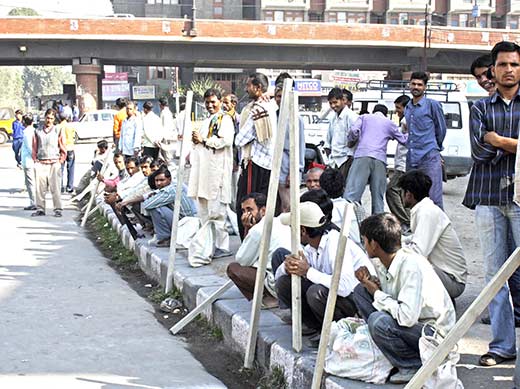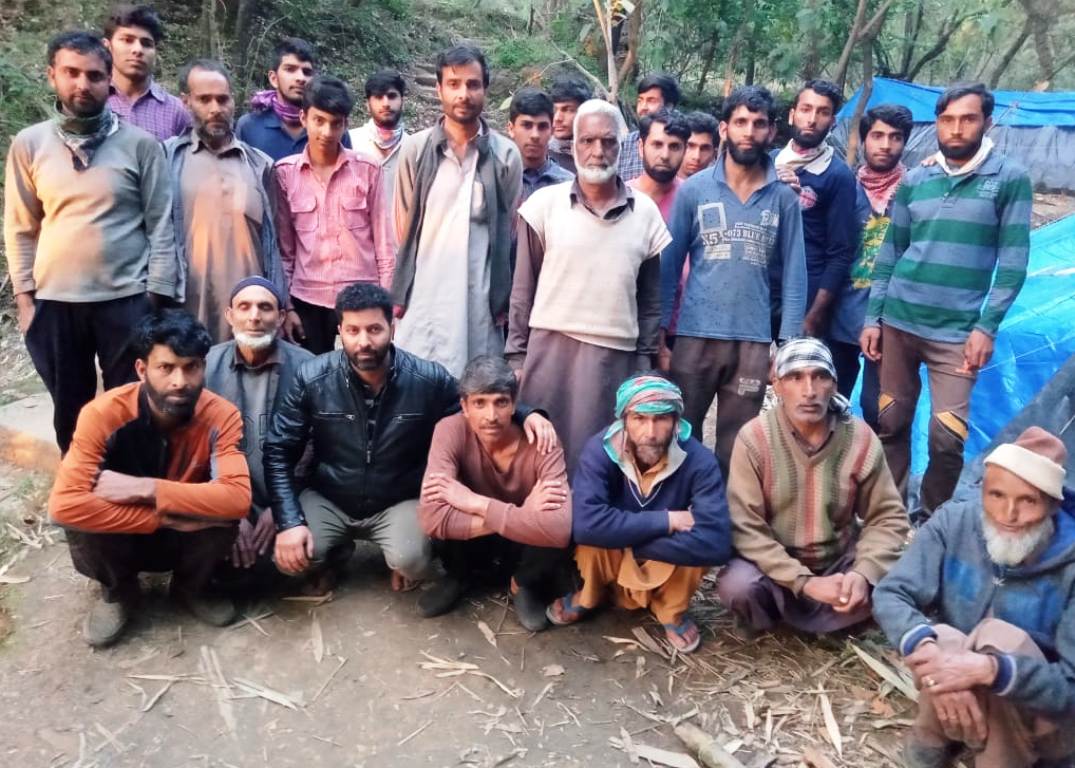by Syed Shahnawaz Bukhari
The Kashmir has a classic syndrome.
People here generally enjoy a decent standard of living and are, therefore, not ready for physical labour. Thanks to the land reforms, everyone except a minuscule minority has a piece of land or a small orchard somewhere. No wonder then, along with poultry and cattle we also import human labour as well.

Skilled workforce in Srinagar. KL Image: Bilal Bahadur
From construction sites to saloons, from paddy fields to wazwaan sheds, we see these workers run the show. As per conservative estimates, there are about six lakh non-local skilled and unskilled labourers engaged in different vocations in Kashmir. Since they stay here for 7-8 months, roughly more than 125 million man-days are lost to the outside labour every year in an economy as small Kashmir.
During the recent Covid-19 crisis, I observed local unskilled labourers arriving from the other parts of the country in huge numbers. This is a complete paradox and social scientists need to work on this. In Covid-19 crisis only, I got an opportunity to have a haircut by a local hairdresser that we rarely find nowadays, and believe me, that was the best hair trim I ever had in life- vocal for local.
A more worrying trend though is poor local workforce participation even in the skilled sectors. Historically Kashmiris have been very skilled craftsmen not only with the handicrafts but in all other skills like carpentry, masonry and so on. The world-renowned art and craft, heritage buildings or the historical monuments are living proof of that. Now there is no one even to transmit these arts to future generations. No efforts at any level have been made to modernize and make these skills attractive. Modernization of traditional craft industry is something the present regime should seriously work at.
At another level, with the faulty government policies in past, there has been a progressive sidelining of local entities with almost all significant works being grabbed by the outside companies. Be it major construction works or IT projects or the supply contracts, local entities were pushed to the wall.
For example in the IT sector, the conditions in the tender document were put as such that ensures culling out of the local entities. Some IT projects that could be executed by the local youth in lakhs went to outside companies as a multi-crore project. Major public procurement deals also culminated through the outside suppliers robbing local youth of the opportunities of entrepreneurship. In construction sector also major projects are executed by outside companies, though lately a slew of measures were taken with respect to ease of doing business so that more and more local entities are able to participate in the tendering processes.

A group of Kashmiri labourers sitting idle somewhere in Himachal Pradesh after the lockdown stopped their work. Photo: Internet
It is in our best interest among other things, to ensure an encouraging environment for small local businesses that are labour intensive, especially that involve skilled labour. We must also focus on the industrial production of goods and consumer items that can be produced locally and are yet imported. Although a number of incentive schemes are available with the government departments, the government can ensure this with further attractive and subsidized interest rates, tax incentives, preference in works and services contracts for the locals.
That will go in sync with Hon’ble Prime Minister’s call for Atmanirbhar or self-reliance that essentially calls for the need to de-incentivize the import of goods and services that can be manufactured domestically.
Ensuring the dignity of labour is something that needs attention at the social level. This requires not only a revolutionary change in our education system but a total overhaul in the mind-set of the citizens, contractors, administrators, planners and leaders.
It cannot be denied that these outside workers and entities have been of great assistance in overcoming the labour shortage in Jammu and Kashmir and have contributed immensely towards its development. However, with the cognizance of overdependence on them and the negative impacts induced by it, strategies need to be evolved to reduce this dependence and attract more local workers and entities towards the skilled job market. Negative results of this trend towards using of outside workforce and services, without enabling or encouraging the local resources are manifold and demand immediate attention.
As Prime Minister also said in the national context, self-reliance does not mean cutting off from the rest of the country, but we must take all the steps that improve our domestic systems and the economy.
On the training side, there is a large network of vocational and training schools existing, but they are not performing. The ITI pass-outs become part of the long queue for government jobs and only add to the existing problem. With degree colleges making entry into villages, the increasing number of labourers entering the workforce is college-educated. Instead of these paper degrees, the present youth need not only vocational training but an attitude of labour and enterprise.
Incidentally, the vocational training is making a resurgence with the government allocating more resources to technical education and skill development and career programs. Networking between training institutions with the local industry will also create strategic relationships which are very important to help in the formation of the future knowledgeable and employable skilled labour force.

Non-local labourers at Srinagar Airport waiting for their flight to flee the valley after floods. The photograph was taken at the outside gate of the Srinagar airport at a time when Srinagar was underwater. KL Image: Masood Hussain
Among the youth, the biggest wish from any government remains to create more government jobs, but there is a limit to it for any government. Government job pie is ever-shrinking and there has been consistent fall in the recruitment in central and state departments over the years. Also to maintain the fiscal line, not all the government vacancies are being filled. Jobs in government and banks have also shrunk over the years because of information technology. And with the recent promulgation of new domicile law, the already shrunk government job market in Jammu and Kashmir has become immensely competitive.

Syed Shahnawaz Bukhari
College pass-outs from Degree College Karnah or Kishtwar have to bear in mind that they have to compete with pass outs of likes of IITs, IIMs, Marinda House, St Stephens, St Xaviers etc. Nothing short of excellence is going to fetch you a government job. Private sector service jobs are also not growing because of the peculiar situation at this place. Thus, our youth must also look back at the primary sectors viz. Agriculture and Horticulture that have been the traditional backbone of our economy. There is a great scope in the introduction of technology and intervention in the entire value chain in the production of fruits and vegetables from the farm to fork. It can bring a silent revolution in the economy and the job market.
(Author is a civil servant. The write-up was lifted from the author’s Facebook wall.)
from Kashmir Life https://ift.tt/2YGLVwS
via IFTTThttps://kashmirlife.net
No comments:
Post a Comment